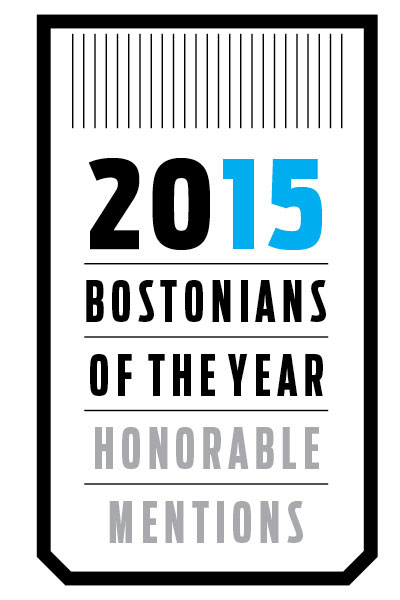
For more honorable mentions and the winning Bostonians of the Year, click on the drop-down list at the bottom of this article.
Every once in a while, late on a Friday afternoon, Boston Police Commissioner Bill Evans slips in the back door of Touchie’s, a neighborhood bar on East Eighth Street in South Boston that would never be confused with the establishments on and off Broadway where the brick is overexposed and the drinks are overpriced.
Clad in jeans, a running jacket, and a scally cap pulled low, he looks undercover. But he’s off duty. He heads for the high tables at the back.
“Hey, Mouse!” bellows Tommy Evans, a gas worker, at his little brother.
Bill Evans is one of the most powerful people in the city. But when he climbs onto a stool at Touchie’s, surrounded by his big brothers, he’s just Mouse, the runt of the litter.
If there is one word to describe Bill Evans, it is grounded. He grew up one of six boys in a two-bedroom apartment on the middle floor of a three-decker in Southie. He was a toddler when his mother died. He wasn’t yet 10 when his 11-year-old brother, Joe, was struck and killed by a car. He was barely a teenager when his dad died.
He was raised by his brothers, followed his brother Paul onto the police force, and, like Paul, eventually assumed the top job.
Bill Evans topped every promotional exam he took, but he doesn’t come across as the smartest guy in the room. He is not a gifted orator. But he is genuine, the anti-phony, with an accent and demeanor that convey authenticity.
An inveterate marathoner, he carries the sinewy build of a runner and swims in his suits. But his unimposing size and humility grant him a counterintuitive aura of authority.
He made his name as a commander who was smarter than the tough guys: While other cities saw Occupy movements descend into violence, the protest ended in Boston with handshakes, because Evans, then a superintendent, treated demonstrators with respect. He showed his mettle, and characteristic calm, by taking Boston Marathon bomber Dzhokhar Tsarnaev in alive. Marty Walsh noticed and made Evans commissioner in 2014.
With Evans at the helm, Boston has mostly avoided the poisoned atmosphere where police shootings and brutality have opened festering divides, especially in minority neighborhoods. He has deftly walked that fine line of responding to community demands for greater transparency and accountability without throwing his officers under the bus.
Last March, after John Moynihan was shot in the face by a career felon who was then shot dead by Moynihan’s fellow officers, Evans surprised some by expressing concern not just for his wounded officer but also for the family of the man who tried to kill him.
If Evans is not the most telegenic police commander in America, he may be the most empathetic. He knows what it’s like to lose someone you love suddenly or violently.
He is his brother’s keeper, because his brothers kept him on the straight and narrow. He tries to do the same for his city.
Read more from the Bostonians of the Year issue:
Select a name from the drop-down list below.
Kevin Cullen is a Boston Globe columnist. Send comments to magazine@globe.com.